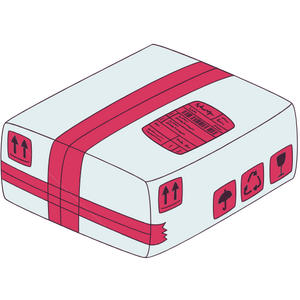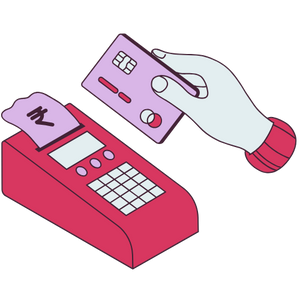1/4 The menstrual cycle. Menstruation
For this new back-to-school season, we at Loulou decided to go back to basics. We believe it’s essential for better understanding and knowing yourself.
There’s nothing better than decoding our menstrual cycle and its mysteries. This is the first article in our series dedicated to the female hormonal cycle. Over the coming weeks, we’ll look in turn at the follicular phase, ovulation and the luteal phase.
First stop: menstruation, or your period. This is without a doubt the phase of our cycle we know best, because it’s the only one that’s clearly visible.
Periods appear regularly (though not always, as we’ll see). They annoy us, hurt us, get in the way and sometimes even reassure us. Why do they happen? Why do they come back again and again? Why do we stop having periods when we’re pregnant? Why are they sometimes irregular?
We’ll try to cover all the questions you may have so you can better understand this common yet still unfamiliar phenomenon for many.
With Loulou, your period will no longer hold any secrets for you!
The menstrual cycle and periods
A quick reminder (you can find a detailed guide on the topic here: Menstrual Cycle Guide) of why we end up pulling on our favourite Loulou period panties every month.
A woman’s body follows a cyclical process that generally lasts an average of 28 days (21 to 35 days). This finely tuned phenomenon prepares the body for a possible fertilisation.
From puberty to menopause, a woman goes through many cycles (around 13 a year). Various hormones secreted in the brain trigger a whole process in the ovaries, the fallopian tubes and then the uterus.
Periods last a few days, 3 to 7 days on average. They appear as light then heavier bleeding before becoming light again at the end of the period. Your period is proof that the egg has not been fertilized and that you are therefore not pregnant.
The uterus had prepared itself to welcome an embryo by making its lining, the endometrium, thicker. This uterine lining thickens throughout the cycle. Since no implantation occurs, the endometrium breaks down because it’s no longer needed. Everything is expelled and corresponds to the vaginal bleeding and your period.
Questions/answers about periods
✤ Why can periods be painful?
While some lucky ones have trouble-free periods, others unfortunately experience painful periods. You may usually feel tension in your lower abdomen. That’s your uterus contracting (uterine contractions) to shed the uterine lining.
Some pain is still manageable, but you should be concerned when it becomes unbearable and disabling. Very intense pain can also be a sign of something else (infection, illness, endometriosis).
There are solutions to help ease the pain: exercise, slow down your pace, improve your diet, and take dietary supplements. Don’t hesitate to talk to your doctor, midwife or gynecologist. They can prescribe suitable pain relief to help you.
In any case, it is not normal to suffer during your period.
✤ Why is my period so heavy?
Menstrual flow can be light, medium, heavy or hemorrhagic. Some women experience a strong, heavy or even hemorrhagic flow. Contraception, especially the copper IUD, can make your periods heavier. It can also simply be genetic.
✤ Why are my periods late this month?
First of all, don’t panic. Every woman experiences a late period at some point. For many reasons, your cycle can shift. Stress, jet lag, medical treatment, certain eating habits, high‑level sport or starting a new form of contraception can all disrupt your period.
Of course, you can take a pregnancy test to be sure. In themselves, irregular periods are not usually a cause for concern if it only happens occasionally and your cycle settles back into its usual rhythm the following month.

✤ Why do I get acne when I have my period?
A lovely pimple has popped up overnight, reminding you that your period is on its way too. Nothing surprising there. This is typical hormonal acne. Hormone levels fluctuate a lot throughout the cycle.
Just before your period, testosterone is higher than the female hormones. This hormone is well known for increasing sebum production and therefore triggering acne.
✤ Why am I bleeding between periods?
Bleeding outside your period is also called spotting. There are several reasons why spotting can occur.
✤ Can you stop your period?
For comfort reasons, but also to ease pain or avoid a debilitating hemorrhagic flow, it is possible to stop your period. Some hormonal contraceptive methods can significantly reduce or even completely stop menstruation.
✤ I missed my period and I'm not pregnant, what does that mean?
If your pregnancy test is negative, we recommend confirming the result with a blood test, which is 100% reliable. Missing periods (“amenorrhea”) or a late period can have several causes.
The menstrual cycle you’re going through may be anovulatory, meaning there was no ovulation. It can also be a sign of perimenopause. Other causes are possible (stress, anorexia, and also PCOS). If this keeps happening, see a doctor!
✤ What are the signs your period is coming?
Depending on the woman, you may experience (or not): migraines, bloating, fatigue, breast tenderness, sluggish digestion, abdominal cramps, and lower back pain. These are signs of PMS or premenstrual syndrome. 80% of women experience one or more of these symptoms.




























